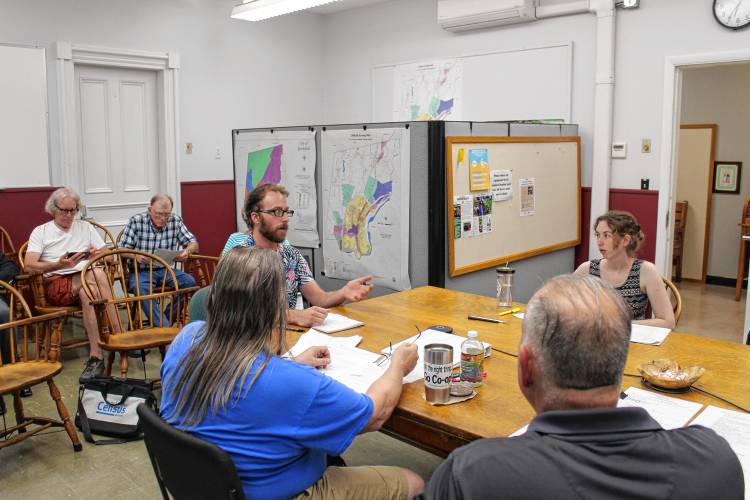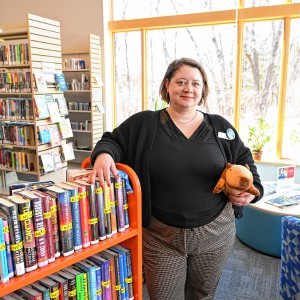Greenfield considers forming task force on housing production

At-Large City Councilor John Garrett discusses a package of proposed zoning amendments intended to ramp up housing development with the Greenfield Planning Board on Thursday. STAFF PHOTO/ANTHONY CAMMALLERI
| Published: 08-02-2024 4:30 PM |
GREENFIELD — After substantial public comment and lively discussion weighing the pros and cons of different ways to develop the city’s housing stock on Thursday, the Planning Board began considering the formation of a task force to study the issue more thoroughly.
A package of proposed zoning amendments, if passed through a series of public hearings followed by a City Council vote, would increase the number of units allowed in new multi-family dwellings and would make it legal to construct multi-family buildings by right in semi-residential zones. The amendments would also alter dimensional requirements to allow the construction of townhouses in the city’s Central Commercial, General Commercial, Semi-Residential and Urban Residential zones, and would allow the establishment of accessory dwelling units, also known as “in-law apartments,” by right throughout Greenfield.
At-Large City Councilor John Garrett, who worked alongside Planning Director Eric Twarog to draft the proposed changes, spoke before the Planning Board, outlining his motivation — to make housing more affordable by increasing its supply.
“This is a city that I moved to six years ago because I could afford to live here, and I am incredibly grateful for that. There’s a direct connection between the number of housing units in a community and the demand for housing and the price,” Garrett said. “We have a community that clearly has a lot of demand, which is wonderful that people want to move here, and the goal of making these kinds of changes is to ensure that others who want to make Greenfield their future will be allowed to do so.”
Susan Worgaftik, coordinator of Housing Greenfield, a local advocacy organization that encourages the development of affordable housing in the area, spoke in support of the amendments, mentioning that the city needs to develop 600 to 1,000 housing units to support the city’s current population.
“We have a lot of folks doubled up, we have a lot of young people that are couch surfing, and also, of course we have folks who are living outside right now,” Worgaftik said. “This kind of zoning gives us an opportunity to be able to meet the needs of the population we have here without changing the character of these neighborhoods very much at all.”
While the majority of those who spoke before the Planning Board supported the majority of the proposed amendments, others, such as resident Al Norman, expressed concern with particular aspects of the package. In particular, he spoke about the negative implications of allowing development by right and the potential for ADUs to be constructed without a special permit.
Norman noted that the state’s Affordable Homes Act, which was laid before Gov. Maura Healey’s desk Thursday, would allow the ADUs by right in single-family residential zoning districts across the state, a bill that he referred to as “nonsense.”
Article continues after...
Yesterday's Most Read Articles
“I’m hoping that Greenfield won’t put ADUs in industrial zones. I’m hoping that we won’t put them in commercial zones,” Norman said. “The idea of us absorbing 600 new units quickly is just, to my mind, by definition, bad planning. We cannot absorb that many units.”
Resident Mitchell Speight, who said he supports policies that would help Greenfield residents become homeowners, argued that the proposed zoning changes must be revised to ensure that the units created are not bought and rented out by large real estate cooperatives or private equity firms.
“You’re talking strictly landlord-tenant relationships. That’s dangerous. Most of what you’re proposing will attract absentee landlords,” Speight said. “We need to be creating a path to home ownership, not landlord-tenant. We have that already, we know where that model leads.”
As the board further deliberated over the proposed changes, Twarog suggested the formation of a city task force to work more closely on the proposed amendments by a specific deadline, an idea that was well received by other board members.
Board member Sarah Brown-Anson also suggested that the board isolate the proposed amendment related to ADUs from the others, noting that it is the most controversial, and could potentially become moot in the event that Healey signs the Affordable Homes Act.
Mayor Ginny Desorgher expressed gratitude to both the Planning Board and Garrett for their efforts to develop the city’s housing stock. She said she believes the most economical way to build housing would be by “building up” and constructing multi-story homes.
“We cannot build housing fast enough,” Desorgher said, “and I applaud [Garrett] and members of this board for beginning to look at these issues.”
Anthony Cammalleri can be reached at acammalleri@recorder.com or 413-930-4429.






 New panel to review senior housing proposals in Deerfield
New panel to review senior housing proposals in Deerfield Shutesbury reviewing how to improve safety on Lake Wyola in wake of accident last summer
Shutesbury reviewing how to improve safety on Lake Wyola in wake of accident last summer Local libraries react to state funding cuts, federal administrative leave
Local libraries react to state funding cuts, federal administrative leave Colrain zoning board approves variance for Call Road cell tower
Colrain zoning board approves variance for Call Road cell tower
